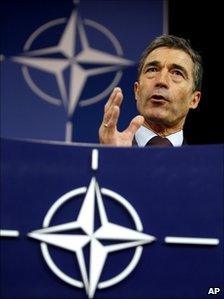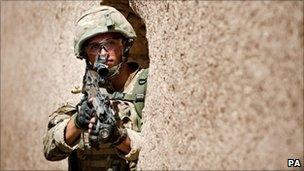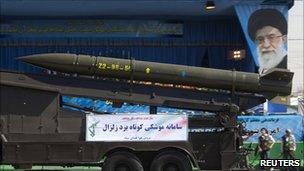Nato considers new mission statement
- Published

Mr Rasmussen must show Nato has a relevant role for the future
The North Atlantic Treaty Organisation (Nato) - which was born during the Cold War - needs a new mission statement.
In a highly unusual joint meeting, both the foreign and defence ministers of Nato member states are gathered in Brussels to consider changes to the alliance's strategy to be agreed at a summit next month.
Issues like missile defence and nuclear disarmament are on the agenda, as the Alliance seeks to adapt itself to new security challenges against the backdrop of Afghanistan.
Before the ministers is a draft "New Strategic Concept, external", penned personally by the Nato Secretary General, Anders Fogh Rasmussen.
It is, reportedly, a handy 10 pages long. But it has the job of showing that Nato has a relevant role for the future.
Afghanistan fight
The last Nato Strategic Concept, external came more than a decade ago, in the shadow of the Kosovo War.
But a lot has happened since then, including the 11 September 2001 attacks on the United States and, of course, the invasion of Afghanistan.
Nato is engaged in the fight of its life in Afghanistan.
There are some 120,000 international troops attached to the Nato-led International Security Assistance Force (Isaf).
Now, Nato officials say that there is more to the organisation than the Afghanistan campaign.
That may in part be because the conflict's outcome may still be in the balance.
'Global partnerships'
But the alliance's need to reform and revamp its image has been causing some frictions between some European members who have wanted to concentrate on defence closer home, and others - like the US - who think Nato should keep its sights set on wider horizons.
US Defence Secretary Robert Gates appeared to grumble in a speech in Washington earlier this year that perhaps European demilitarisation had gone too far.

The ministers are considering Nato's future against a backdrop of looming defence cuts
Mr Rasmussen has clearly tried to balance both perspectives.
In a briefing on Monday, he said: "The new Strategic Concept must reconfirm Nato's core task - territorial defence - but modernise how we do it, including cyber defence and missile defence."
But then the secretary general added that the new blueprint must define clearly Nato's mission to manage a full spectrum of crises, and "also mandate Nato to reach out further than it ever has before".
"Our partnerships are central to our success, and we must engage more actively with partner countries around the globe," he added.
That could mean more missions like the anti-piracy patrols off the coast of Somalia.
But could it also mean to some eyes Nato veering too much towards the "global policeman" role?
Defence cuts
As for the issue of Nato taking on a full missile defence mission, the main driver behind that is growing concern about the perceived threat from particularly Iran's expanding arsenal of such weapons.

Iran's is expanding arsenal of missiles
But a key issue is also how this new mission would fit in with Nato policies on nuclear deterrence and nuclear disarmament - arguments which have apparently pitted France against Germany in Alliance counsels.
Mr Rasmussen said missile defence is not a substitute for nuclear deterrence.
And then there is the question of how all this fits in to relations with Russia.
The alliance's foreign and defence ministers are also considering all this against a backdrop of looming defence cuts in the UK and other major member states.
That will mean a big slimming down for Nato as well that could prove controversial, with cuts in command structures and official bodies, but also more pressure to look at the co-operative purchase and operation of key equipment in the future.